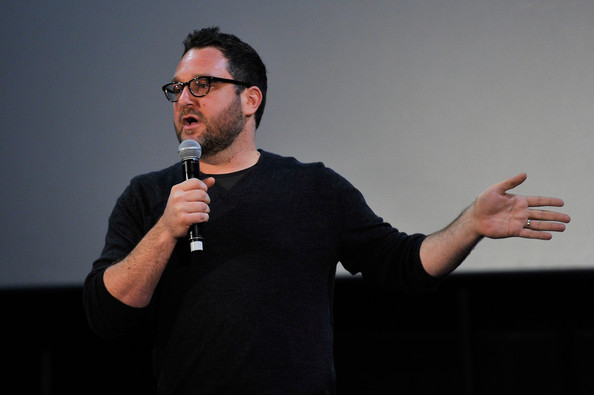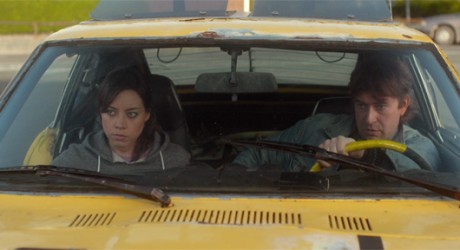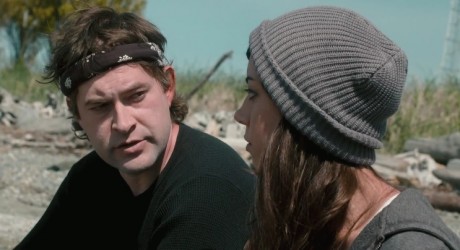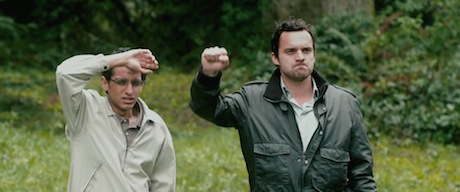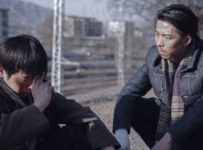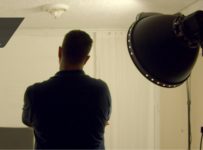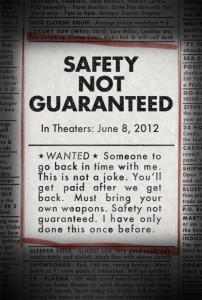 The Sydney Film Festival closed this year with one of the most crowd-pleasing films to come out of Sundance 2012, Colin Trevorrow’s debut feature Safety Not Guaranteed. We had the pleasure of chatting with the director a few days before the Sydney premiere.
The Sydney Film Festival closed this year with one of the most crowd-pleasing films to come out of Sundance 2012, Colin Trevorrow’s debut feature Safety Not Guaranteed. We had the pleasure of chatting with the director a few days before the Sydney premiere.
When an unusual classified ad inspires three cynical Seattle magazine employees to look for the story behind it, they discover a mysterious eccentric named Kenneth, a likable but paranoid supermarket clerk, who believes he’s solved the riddle of time travel and intends to depart again soon. Together, they embark on a hilarious, smart, and unexpectedly heartfelt journey that reveals how far believing can take you.
We need to thank the Sydney Film Festival and the folks at Cardinal Spin for organising this for us, and of course, Colin Trevorrow for his time and answers. We also need to thank him for being patient during some technical difficulties we had with the recording!
Safety Not Guaranteed is released in the US on 8 June 2012 from FilmDistrct and in Australia on 20 September 2012 from Rialto.
First of all, I just wanted to say how much I love Safety Not Guaranteed.
Thank you.
I think it’s rare to find such an unapologetically magical film, and a romantic one for that matter. I saw it in Sundance London in April, and the audience reaction there was indicative of how universal this film is.
I imagine you were at one of the screenings I was at. It was a lot of fun.
Is it difficult to get something that unapologetically magical and romantic made today?
You know, I think in this scenario, I wouldn’t necessarily connect that to money, but I think that the fact that we made the film for so little money gave us a lot of freedom in all aspects. We just got to do something that didn’t necessarily stick to the rules of storytelling that are prevalent right now. I was a studio screenwriter, which I had been for many years which is why my IMDB just falls off a cliff for a while. You know, I’m very acutely aware of what you can and can’t do in a studio film, and how stories that need to be told with less structure. So for Derek [Connolly] and I, it was very liberating to just to do what felt honest and truthful and good and build something that – I agree, it does feel magical, and that wasn’t a calculated thing. It wasn’t a manufactured thing, it was something that came very naturally out of the process and what we were trying to do. So it’s an earnest sense of magic.
One of the things that warmed my heart to hear you say at those screenings was your influences from the Amblin films from the 80s, particularly Zemeckis and Spielberg of course. Can you talk about those influences a bit in terms of that sense of awe you get in the film. Or ‘hope’ even.
Yeah, I think for me what I was conscious about the whole time was not making it too derivative of my influences. I know where I live, I know where I come from, and I think the part of the goal was to make it feel like, you know, a new version of that. To evoke the feeling that you got when you watch those films, but to not be a carbon copy or a mirror of those films. That’s one of the reasons why I wanted to bring Mark and Jay Duplass, and cast Mark Duplass. Those guys have a very naturalistic, honest way of making their films, and they bring a certain tone to the table that is different than those films, but it does kind of harken back to those films. Especially E.T. [The Extra-Terrestrial], I was watching that recently, and it’s such a loose film…That scene where they are all around the table eating pizza and talking like its, it almost feels like a Altman film at times. I’d forgotten that, so when I look back I realised that the films of Spielberg at that time were not as far removed from the tone of Duplass brothers films as I thought. I feel likes it’s an interesting match and an interesting mix.
Yeah, I feel like one of the things that connects those films and your film is finding that truth within the fantasy, and the truth in the characters as well. So how much time did you and Derek spend researching that original character?
Kenneth came completely out of Derek’s imagination based on the way that the classified ad was written. He had a very specific way of speaking and that reminded Derek of a lot of guys he knew growing up in Florida, who were just these mad loners who believed that whatever they were building in their garage was going to work. You know, he created that character which was very consistent, even though we change the script a lot as we developed it together, Kenneth himself did not change much. There a lot of scenes, especially in the first half of the movie that are just verbatim from the very first draft that Derek ever wrote. In filmmaking, the odds of that happening are pretty slim, and yet it did. Derek just knew that guy, so the research had been happening his whole life in rural Florida.
So this sounds like it was very much Derek’s idea initially. So what were your thoughts when you were first presented that idea as a film?
I didn’t even know what the idea was. I read his first draft of the script, that was my introduction to it. It was a very different film, but the bones of it were there, and the same characters were there and my reaction was very simple. I felt this was an iconic love story that that script wasn’t necessarily addressing. So we worked together to tease out that love story, and look at some of the more metaphorical and thematic elements of time travel that we address in the movie. So everything that Jake Johnson’s character goes through, with his attempt to time travel through the only way we can, which is find somebody on Facebook who you used to love. Then also Kenneth and Darius’ relationship forming, over the course of their time together. We really worked to make it a more emotionally satisfying film without losing the comedy and the mystery and that sort of fun road trip that the original script had. I think that Derek did a fantastic job. He wrote every single word, even though we obviously still had the same kind of story debates that we had, he was still very open to evolving it to a place that made us both very confident.
I understand that you and Derek have obviously worked together and known each for quite some time. One of the things I was reading about was your time on Saturday Night Live together. Obviously it’s a very different style of writing, did you find that there was anything from that, and the studio screenwriting you spoke of before when you came to this project.
The Saturday Night Live thing is, there’s a very small detail there, that we were interns. We weren’t working there in any way that anybody working there at the time would probably remember. We were the guys in the corner making sure they had their coffee, but what it would allow both of us to do was to see what the actual professional entertainment world is. I think you grow up and you have these very idealised, glamourised dreams of what it’s like to be a professional writer or a professional director, and to actually see that these are real human beings who are fallible and flawed and really just trying to make something great and sometimes failing and sometimes succeeding was very eye-opening to me. I think that growing up with all the people I admired, I imagined that they were these god-like figures who shot lightning bolts out of their hands, and then you get these magical films.
What it really is: this trial and error, and I learned that even more in my time as a studio screenwriter. I was very lucky in that the first script that I wrote was purchased by DreamWorks and was produced by Walter Parks who is a brilliant, brilliant story mind and one of the great narrative figures who I think has ever played the game. I know it’s high praise, but the man wrote War Games, and he produced Gladiator, and Minority Report and all the Men in Black films and Catch Me if You Can. Just great stories, great worlds. At that time for me, it was about a five-year period when I was writing other films, but I was working for him. It was pretty educational on a pretty high level. It was really a masterclass, or a grad school to a certain extent. Both of those experiences have made me constantly want to seek out really brilliant people, and try and learn from them, and take their super powers and plug them into my brain and use them for my own kind of evil.
On the flip side, working outside the system I guess, is there anything you found you weren’t able to do in making Safety Not Guaranteed? Is there anything you would have liked to include that you couldn’t?
I would have loved to have more time. Part of me wants the movie to look and feel like a ‘bigger film’, but the other part of me looks at the film and realises that because it looks so scrappy and rough, it actually helps the narrative in a certain way, because we’re sort of lulled into this feeling that we’re watching this little independent film and as it goes along and grows more cinematic. We’re really slowly sucked into it. It’s kind of like the shark not working to a certain extent: at first you wished it worked, but because it didn’t you’re forced to be resourceful. You’re forced to do things in a way that could be a little more economical that it otherwise would have been. So yeah, my god – we shot in 24 days, so if we’d had twice as many days I would have love it. I probably would have been less exhausted, but also I like what we have. Its got its own scrappy little quality to it. That’s a time-travel question really: would you go back and change anything. [Laughs] If you go back and change something, some things might not work and the wheels come off, you know?
I think you said in London, somebody asked you what was the most American quality about the film, and you said something along the lines of the audacity of someone believing they could build a time machine in their garage.
It’s pretty American. A man with no education [laughs], no proof whatsoever that he can do what he says he’s going to do, yet he believes he can do it.
Just in terms of the casting, and it’s hard to imagine that film with any other cast, I understand that two of the roles were written specifically for Jake Johnson and Aubrey Plaza. Would you have made the film without them?
Would I have? Probably. But I didn’t want to. That’s one of the reasons we did it for the amount of money we did it for. If I had made it without them, I could have made it for millions of dollars more, and the reason that we did it for so little was not because nobody would give me the money, but nobody would give me the money with those actors. I believed in those actors, and I believed this movie needed them to work in the way that I wanted it to work, so instead I made it for a quarter as much…in order to have those performances, and I do no regret it.
Following on from that, Mark Duplass is a filmmaker in his own right, and I’m sure you get asked this all the time, but how much influence on the script or did he sit back and be an actor for this role?
He didn’t have any influence on the script that we shot, not because we didn’t want it, but because he was very respectful of what we had built, because he’s a filmmaker himself. He made it very easy for us to make the film we wanted to make. He very slyly did have a lot of influence on the tone of the film by the way that character was played. He made a lot of choices that made Kenneth less broad and less silly, and less easy to make fun of than he otherwise could have been. It’s something we talked about a lot. You could talk about it all day, but it comes down to the choices he makes when the camera’s on him. Mark defined the tone and really set the pace for the rest of the film tonally that allowed us all to find a more emotionally tonal level than we all thought we were going to get. I remember the first time I showed the film to Peter Saraf at Big Beach, and the response was ‘Wow’. That’s a lot more emotional than we ever thought. I think that’s a combination of mine own instincts, and Mark’s to really bring out the human side to the time travel story. The time travel story’s been told a million times and that was going to be our way of standing out is to do something that is a little bit more emotionally true.
I’m not sure there are enough time travel stories actually. I think it’s a lost art form.
I agree. I don’t know why there aren’t as many time travel movies as there are alien movies. They’re both as preposterous. I would argue time travel is a little bit more slightly, but not really. I wish there were more of them. I’d go.
Absolutely. In terms of the time travel, the ending – which I won’t spoil for anybody when I’m writing this up…
I appreciate that.
…but I understand the ending was changed. How hard a decision was that to make?
It’ s a very hard decision. It was one that was really put on me. Everyone was really supportive of it, but I knew that was something I had to own and that I was going to be held responsible for it. I thought about it, I pitched it to the producers and I said ‘Look, this is what I’m thinking of doing’ and I showed them how I would do it. We debated about it for a long time, and we all decided to go away for the weekend and think about what we wanted. We came back that Monday and everyone had that same feeling. Let’s go for it, and it made us feel good. I think that movies are by nature so calculated and thought and manufactured in a lot of ways, and it was one of those rare opportunities that you were almost able to treat it as you would a song. You can end the song any number of ways. You can slowly fade it out, you can end on a very pleasing chord or you can smash the guitar and set it on fire and drop the microphone. We decided to go with that last option.
Judging from the audience reaction, it was a crowd-pleaser.
Yeah, very grunge. Seattle style.
Just looking ahead, and you’ve probably still got your head in the tour for this film, do you have something lined up next for yourself.
I do. I have a few things. The opportunities that have come my way as a result of this thing are alarmingly larger in their scope and scale than this film, and budget than this film. Based on agreements I’ve already made, I’m not really allowed to talk about them yet, but agreements are already made and the kinds of conversations I’m having for films to direct, there is going to be a pretty big leap in budget from the first to the second one. It’s something that I’m conscious of, and a little bit wary of. I’ve seen a lot of really promising directors given these huge films right away. The things the studios are doing, they’re doing it for the right reasons because they want to infuse these big movies with the kind of interesting, fresh nuance that directors from my generation are bringing to movies. What I worry about, and what has happened in some cases, is that voice gets lost beneath the massive requirements that these big movies have. So the challenge I have in taking this on is to stay working with Derek, we’re certainly not breaking up, this is a true partnership and it’s going to remain so for the duration. To continue making these movies honest, but to be able to take some risks even in the context of larger scale stories.
I’ll look forward to whatever comes next and thank you so much for your time today.
Thank you.

